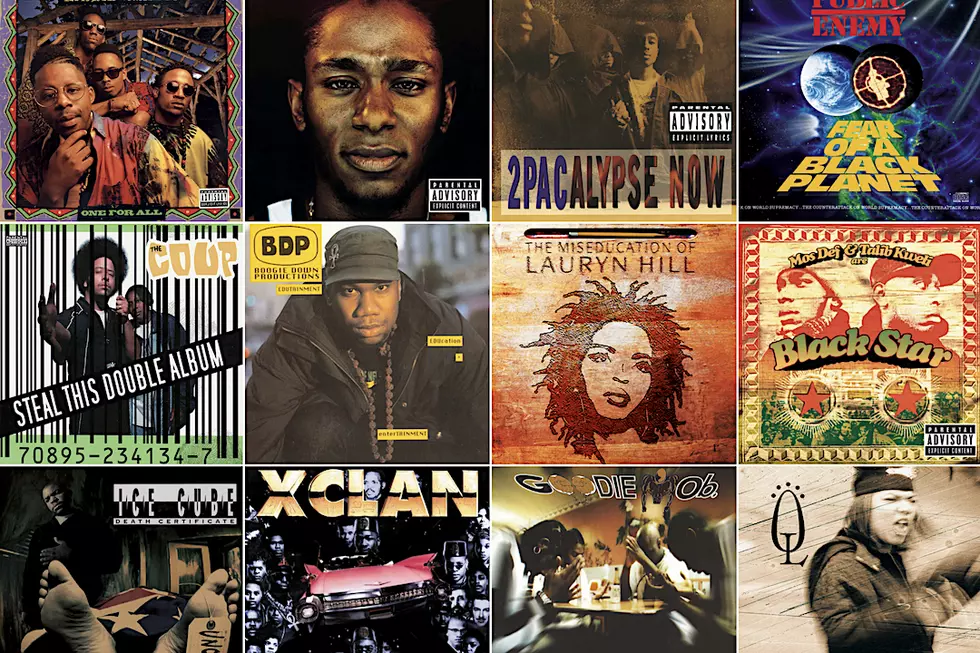
Arrested Development’s ‘3 Years, 5 Months & 2 Days in the Life Of…’ Brought Ethnic Pride and Spirituality to Rap
1992 was an interesting and transitional year for hip-hop, as the culture was stuck at a crossroads. Rap's growth in popularity within the mainstream realm was a testament to the allure of the music, fashion and overall aesthetic of the culture, but internally, there was a growing chasm between artists and fans alike. On one side, there were more socially conscious acts like Public Enemy, De La Soul, A Tribe Called Quest, Queen Latifah, X Clan, and others that promoted individualism, afrocentricity, and knowledge of self, and on the other were rappers more concerned with broadcasting and glorifying the violence engulfing inner-city communities, particularly West Coast heavyweights N.W.A, Ice-T, Compton's Most Wanted, and other artists.
Both factions would experience widespread acclaim and success in their own right, but would butt heads over what constituted as "real hip-hop" and the benefits and affects that their contrasting approaches meant to the black community as a whole. And although the socially conscious remained a fixture within hip-hop, by 1992, the tide had noticeably began to turn, with the gangster rap stylings permeating from Los Angeles overpowering the more poetic and morally-bound musings of their counterparts from the East. However, it would be an Atlanta-based collective by the name of Arrested Development that would emerge take the Billboard charts by storm, leading what would be one of the last stands for unabashedly afrocentric rap music on a widespread level.
Founded by rapper Speech, a native of Milwaukee, the group would fully take shape during Speech's time studying at The Art Institute of Atlanta, where he would meet Timothy “Headliner” Barnwell, a DJ who, along with Speech, would serve as the foundation for the group. Not long after, they would be rounded out by hype man Rasa Don, singers Aerle Taree and Dionne Farris, a dancer (Montsho Eshe), and 70-year-old adviser Baba Oje, but the only thing left to do was to decide on the name that the crew would be known by. After brainstorming, the name Arrested Development felt like an appropriate fit. “We saw the community in a state of arrested development,” Speech shared in an interview with AJC. “And we chose that name as a reminder of what our music should fight against.”
Signing with Chrysalis Records, label red-tape in the form of Chrysalis being brought out by EMI, resulting in Chrysalis acts being released from their contracts, threatened Arrested Development's debut album from ever seeing the light of day. When the dust cleared, the group would survive the purge and go on to make history when their debut album, 3 Years, 5 Months & 2 Days in the Life Of..., was presented to the public.
Released on March 24, 1992, 3 Years, 5 Months & 2 Days in the Life Of... would be one of the most pivotal rap albums of that year and put Arrested Development on the map as one of the biggest acts in all of music.
"Ladies and gentlemen, there are seven acknowledged wonders of the world. You are about to witness the eighth," an ominous voice announces on "Man's Final Frontier," the opening selection on 3 Years, 5 Months & 2 Days in the Life Of...'s that is a sonic hogepodge of sound colliding. Including commentary from Sister Paulette and furious scratching from Headliner, and vocal samples, "Man's Final Frontier" is a party starter with elements of house and boom-bap, and serves as a precursor to the funky, yet home-grown vibes that Speech and company bring throughout.
A raging harmonica greets listeners on Mama's Always on Stage," a rollicking number on which Speech proclaims "Can't be revolution without women, can't be a revolution without children," but the landmark album serves up its first transcendent moment with its third track, "People Everyday."
Interpolating Sly & the Family Stone's "Everyday People," Arrested Developments flip of the song finds Speech describing a situation in which he's encountered by a group of neighborhood thugs in the mold of those portrayed on gangster rap records. Taking a peaceful stroll with his lady "Until a group of brothers started "bugging out / Drinking the 40 oz, going the nigga route / Disrespecting my black queen / Holding their crotches and being obscene," Speech is reluctant to engage in fisticuffs, but is ultimately forced to defend his honor. Featuring a sample of "Tappan Zee" by Bob James, "People Everyday" would be the first reference of gangster rap on the album, a subject which would be broached and analyzed multiple times on the project.
Speech has voiced his own love for gangster rap in the past, citing the cautionary tales of its pioneers, but had become critical with the direction in which the sub-genre was going. "It started to morph into glorifying those same things to where it was no longer letting people know this is what’s happenin’, it was more so wallowing in it, and death and glorification of being able to blow the next guys brains out became the norm and that was added to the person’s credibility, Speech told Cryptic Rock. "Arrested Development purposely wanted to make music that didn’t glorify death, we wanted to glorify life. We wanted to glorify the fact that yes, there is poverty, there is oppression, there is hardship, but there is also hope and there is possibility. We wanted to bring about solutions and talk about the problems but also offer some solutions."
"People Everyday" would be a smash hit, peaking at No. 8 on the Billboard Hot 100 chart, and No. 2 on the Rap chart, and become one of the group's most recognizable musical contributions. "People Everyday"s subsequent selection on 3 Years, 5 Months & 2 Days in the Life Of..., "Mr. Wendel," the third single released from the album, would supersede its success while mirroring it's socially conscious undertones. Peaking at No. 6 on the Hot 100 chart, "Mr. Wendel," a storytelling rap based around a fictional homeless man with a heart of gold and values and morals, would resonate highly, with lines like "Mr. Wendal, that's his name / No one ever knew his name cause he's a no-one / Never thought twice about spending on a ol' bum/Until I had the chance to really get to know one" humanizing vagrants and the less fortunate in a thoughtful manner.
Arrested Development may have risen to prominence due in large part to the singles on 3 Years, 5 Months & 2 Days in the Life Of..., but the album is built on much more than hits, and contains an ample amount of deep cuts that are also praiseworthy. One of those selections is "Fishing For Religion," which touches on the black community's fixation on religious institutions and the docile disposition Arrested Developments feels is a byproduct of that indoctrination. "Grab the hook, grab the line/Grab the bait, grab the box and wait / Tackle and shackle the topic the faculty has chosen / Chosen by many, chosen by plenty," Speech raps while chastising Baptist teachings on what is one of the album's stronger efforts. "Give A Man A Fish," which samples "When It Comes Down to It" by Minnie Riperton, is another highlight from Arrested Development's debut and finds Speech once again unpacking the problematic ethos of gangsterism.
One of the more light-hearted tunes on the album is "Dawn of the Dreads," on which Speech attempts to find the perfect match in the midst of a party while overcoming his tendencies as an admitted outcast. Rhyming, "I try not to admire what I can't obtain or have / Things beyond my reach don't exist to Speech / Seeing how I'm a bit shorter than the average man / I patiently wait for someone I Can reach," Speech comes across as an awkward mack, but ultimately comes across a woman that compliments his vibe.
3 Years, 5 Months & 2 Days in the Life Of... most endearing composition is the one that first announced their arrival on the big stage, and their most successful song to date. Released as their debut single, "Tennessee" was originally not intended to be included on Arrested Development's debut album, but would prove to be the catalyst to jump-start their ascension. Inspired by the deaths of his grandmother, Ardenia Churn, and older brother, Terry Thomas, "Tennessee" was written as a way for Speech to cope with those tragedies and as a plea to God.
"Lord I've really been real stressed / Down and out, losing ground / Although I am Black and proud / Problems got me pessimistic," the rapper laments over lively drums and cowbells, turning in the most iconic and poignant verse of his career. Complimented by vocals by Dione Farris, who would go on to have a critically acclaimed career as a solo artist, "Tennessee" would be well-received, reaching No. 6 on the Billboard Hot 100 chart and topping the Rap chart as well. "Take me to another place/Take me to another land/Make me forget all that hurts me / Let me understand your plan," Speech belts out on the hook, as he calls out to the higher power above and channeling the spirit of his ancestors, making for a classic jam that perfects the art of making bodies move while simultaneously conjuring introspect and deep thought.
Arrested Development may have began 1992 as wildcards, but by the end of the year, the group had become household names. 3 Years, 5 Months & 2 Days in the Life Of... sold over four million copies in the U.S., and was critically acclaim as well. The LP was voted No. 1 in the Village Voice's 1992 Pazz and Jop Critic's Poll, as well as in The Wire's 1992 Critic's choice. In 1993, Arrested Development would nab two Grammy Awards: one for Best Rap Performance by a Duo or Group and Best New Artist, which was a first during that time.
Unfortunately, 3 Years, 5 Months & 2 Days in the Life Of... would be Arrested Development's peak as a collective. Dionne Farris would depart from the group in 1993 following a dispute with Speech prior to embarking on En Vogue's "Funky Divas" tour, and would be replaced by Nadira Shakoor.
Arrested Development's sophomore album, Zingalamaduni, would net the crew another Grammy nod, but would be a commercial failure in comparison to 3 Years, 5 Months & 2 Days in the Life Of..., and would be their last album on a major label. Internal disputes between Speech and Headliner would lead to the group dissolving in 1996, with Speech embarking on a solo career before reviving the group in 2000.
Their musical run in the rap game and may have been short-lived in hindsight, but Arrested Development remain one of the more accomplished rap acts to bring socially conscious musings, religion, ethnic pride, spirituality, and live instrumentation to the mainstream. Twenty-five years removed from its release, 3 Years, 5 Months & 2 Days in the Life Of... is regarded as an album that blazed trails and opened doors for hip-hop that have yet to be closed.
More From TheBoombox




![Arrested Development’s Speech On New Album, Kendrick Lamar and Black Lives Matter [INTERVIEW]](http://townsquare.media/site/625/files/2016/02/speech-featured.jpg?w=980&q=75)




